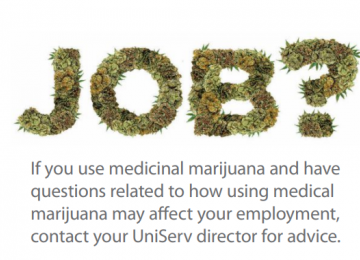By Daniel Bryar, MNEA General Counsel
Despite the passage of multiple legalization measures, possessing marijuana or being under the influence of marijuana in connection to your employment can still cost you your job.
Missourians have twice approved marijuana legalization questions. In 2018, voters amended the state constitution to permit medicinal marijuana use for certain qualifying medical conditions when a physician recommends such treatment. The provision removed criminal prosecution for qualified possession of marijuana but provided no explicit employment protections related to possession or use of marijuana in connection with employment. Thus, employees could still be discharged for possessing marijuana on school grounds, including places like school parking lots. Likewise, the measure provided no employment protection for impairment while at work.
More recently, Missouri voters approved a question in November 2022, which again amended the constitution. The measure, in part, permits sales of recreational marijuana to individuals over 21. The 2022 update also grants limited employment protections for individuals with valid medicinal marijuana cards. Specifically, the measure prohibits discrimination in terms or conditions of employment against employees based on their status as a medicinal marijuana patient or caregiver to someone with a valid medicinal card, or for legal use of marijuana off workplace premises during nonworking hours.
Employees may still face discipline, however, for use or possession of marijuana at work or for being under the influence of marijuana while at work. Moreover, the nondiscrimination protections do not apply to employers if those protections were to cause the loss of any monetary or a licensing-related benefit under federal law.
One recurring question is whether a district employee may be disciplined for lawful use of marijuana, either medicinally or recreationally, during non-working hours but who subsequently tests positive for marijuana on an employer-directed drug test. Marijuana remains in a person’s system while the body metabolizes the drug and may alert as positive on an employer’s drug test for days or weeks after consumption, even if the individual was not impaired at the time of the test. Drug testing for only present levels of psychoactive or impairment-arousing compounds are not standardized, though some efforts are underway to change that trend. For instance, beginning in January 2024, California employers may have to disregard work-place drug tests showing positive results for only non-psychoactive marijuana compounds.
Presently, a positive drug test for marijuana following an administration referral may compromise continued employment. Remember, school administrators can refer employees for drug testing upon reasonable suspicion of impairment at work. Reasonable suspicion is commonly described as specific, contemporaneous, articulable observations concerning the appearance, behavior, speech or body odor of an individual. This means that a district employee who returns a test positive for marijuana will likely have to argue the result was from lawful consumption away from school premises and did not result in impairment at work. Also, the employee will have to argue that the administrator’s underlying reasons for referral do not support an inference of impairment.
Separately, employers may refer employees for drug testing following a workplace accident. Employers with a relevant drug-test policy may require the injured worker to test for drugs or alcohol. If the employee refuses a drug test, the employee may forfeit benefits under the state’s workers’ compensation law. If the employee does test, a positive test may reduce workers’ compensation benefits by 50 percent and may forfeit all benefits if the drugs/alcohol were the proximate cause of the injury. Following a positive drug test, the law presumes the workplace accident was sustained in connection with drug use, and the employee then has the burden to disprove.
Recent changes in law, the standards employers must observe for drug testing, and the strength of the limited protections for those with valid medicinal marijuana cards will likely be subject to future court challenges.
Marijuana use continues to pose dangers for public employees’ careers. MNEA urges school personnel, including individuals with valid medicinal marijuana cards, to never possess, consume, or be under the influence of marijuana at any school-sanctioned function or on school grounds, including a parking lot. Similarly, individuals must avoid bringing the smell of marijuana to work. Marijuana odor is commonly cited in impairment cases as providing grounds for reasonable suspicion to refer an employee for drug testing. To be safe, avoid smoking marijuana and wearing the same clothes into work that you wore while smoking or while someone near you was smoking marijuana. Moreover, avoid publicizing at work, on your social media, or anywhere else your use of recreational or medicinal marijuana. If you must submit to a work-place drug test, producing a valid medicinal marijuana card may help refute the results of positive testing. However, unnecessarily publicizing your use of marijuana to colleagues or administrators is just a bad idea.
Published in the spring 2023 issue of Something Better.

